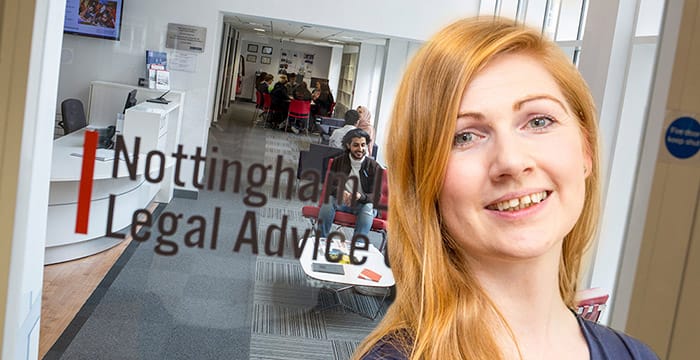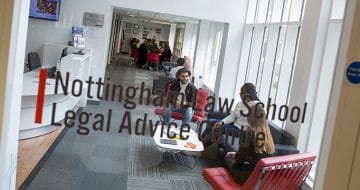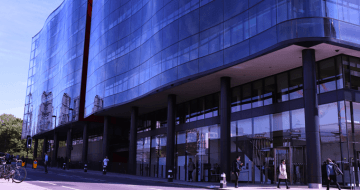Laura Pinkney, head of Nottingham Law School’s Legal Advice Centre, chats to Legal Cheek’s Aishah Hussain ahead of her appearance at tomorrow’s Future of Legal Education and Training Conference 2019

That early, hands-on experience helps prepare students for legal practice is something that Laura Pinkney, head of Nottingham Law School’s Legal Advice Centre, firmly believes.
Her own background speaks to this. It started with a sandwich placement Pinkney completed as part of her four-year undergraduate law course at Nottingham Trent University (NTU). She chose to spend that year with national outfit Cartwright King Solicitors (CK), and stayed with the firm for 16 years. The next step after the placement was a stint as a paralegal before studying the Legal Practice Course (LPC) part-time at Nottingham Law School, alongside her training contract. Pinkney, who specialised in fraud and confiscation, qualified in 2008 and seven years later, made partner. She was the first at the firm to have progressed from placement student to partnership.
But it was her longing to further her career in access to justice and legal education that recently saw her take a new career path. As a solicitor at CK Pinkney often undertook legal aid work but sweeping cuts to legal aid made it difficult to give cases the time and attention they deserved whilst remaining commercially viable. So, with access to justice in mind, the NTU alumna went back to her roots. Pinkney joined NTU in January this year to lead its Legal Advice Centre — a decision that was also influenced by years of experience involved in trainee development while at CK, her post as president of the Nottinghamshire Law Society (the youngest in its 144-year history) and chair of its Education and Training Committee. “It was the perfect blend of everything I believed in,” reflects Pinkney.
Under her leadership the Legal Advice Centre, which is an accredited teaching law firm, has gone from strength to strength. Last academic year saw 324 NTU law students (from first-years right through to postgraduates) actively participate on 374 cases. Pinkney strongly recommends that students get involved in the practical side of things. Casting her mind back to her own year-long sandwich placement and the rewards she reaped there, Pinkney thinks working in a clinical legal setting gives students an “edge”. She continues:
“The application process for training contracts is now so competitive, and experience of working within a professional law firm, such as ours, helps students to stand out. They can share interesting examples of working with real clients on cases, and that is invaluable to both students and their future employers.”
It doesn’t stop there. Student volunteers often have to juggle their study commitments alongside their involvement in the Centre (whether extra-curricular or as part of a module towards an assessment), and that involves having good time-management skills. There’s a shared work space, too, and students team up to offer drop in clinic sessions while building rapport with colleagues. One of the most important skills to be gained, however, is communication. “A student could have amazing academic credentials but if they can’t sit down with a client and relay to them, in normal language, the law, or empathise with them and gain their trust, they won’t make a very good lawyer,” says Pinkney. She has seen first-hand the confidence of students grow: “Some students are terrified to even pick up the phone upon starting and those are the ones that may go on to conduct advocacy later down the line.”
Indeed, the ability to conduct advocacy is one huge perk to getting involved with the Centre which received the official Alternative Business Structure (ABS) seal in 2015, giving it its novel teaching law firm status. “One of the drivers behind us receiving an ABS license was to offer our clients a full service: where we can see cases right through from start to finish,” explains Pinkney. Alongside this, students are able to run their own cases which may include conducting their own advocacy under the supervision of qualified solicitors. Students represent clients in tribunals at the county court in Nottinghamshire and the surrounding areas and Pinkney says some have even received feedback from judges who comment on the quality of their submissions and advocacy.
Then there’s the early introduction to professional ethics and compliance that NTU students get — solicitor-knowhow you wouldn’t necessarily expect your average law grad to have. The teaching law firm is even looking to introduce time recording and a case management system to better simulate the work of a solicitor.
It’s a model that Pinkney thinks will spread: “A lot of regulatory compliance has put some law schools off the idea given the amount of resources and time needed… but I’m surprised more aren’t tapping into this space.” This in mind does Pinkney think that more law schools should focus their efforts on clinical legal education? The answer is a resounding yes for the reason that the skills students learn are transferrable to all sorts of roles and not just limited to legal practice. That student too afraid to answer the phone? With the four supervising solicitors’ training, support and feedback at the Centre, students, Pinkney says, flourish on a personal level too.
Certainly the work undertaken — which includes free legal advice on social welfare, housing, family, employment, business, commercial and intellectual property, as well as affordable, paid-for commercial assistance to social enterprises, small businesses and start-ups — is incredibly rewarding. NTU announced in March it had recouped over £3 million in compensation and benefits for clients in just five years, with almost one third of the substantial seven-figure sum recovered last year. “That was a massive milestone and was really good for the team to see their efforts printed in black and white,” says Pinkney. The firm succeeds in 90% of the social welfare cases it takes on, and on one occasion student Francesca Shellard achieved a whopping £45,000 award on behalf of her client during a social security tribunal hearing. “The work we do can be life-changing for our clients, all of whom are from the local community. They are grateful to us for providing access to justice.” Indeed, they are, and when we met, I was impressed by the colourful array of ‘thank you’ cards dotted along the Centre’s walls.
Pinkney will kick off the afternoon panel session on clinical legal education at Wednesday’s Legal Cheek Future of Legal Education and Training Conference 2019. The session, which is new for this year’s Conference, will touch on the benefits of acquiring experiential learning experience during the undergraduate law degree.
What can we expect to hear from Pinkney? She’s hoping to give an overview of how the teaching law firm works, the benefits of operating as a regulated law firm, and the distinction between that and a university law clinic. We’ll also hear what’s next for the Legal Advice Centre — the only Free Representation Unit outside London. Pinkney tells me she’s very excited about expanding the service offering to other areas where there is an unmet legal need. The Centre is also gearing up for the major changes set to be brought by the Solicitors Qualifying Examination (SQE) when it comes into force in autumn 2021, and Pinkney notes the important role the Centre will play in SQE2 preparation and qualifying work experience (QWE).
Laura Pinkney will be speaking during the afternoon panel session on clinical legal education and apprenticeships at the Future of Legal Education and Training Conference 2019 on Wednesday 22 May at Kings Place London. Final release tickets are available to purchase.



